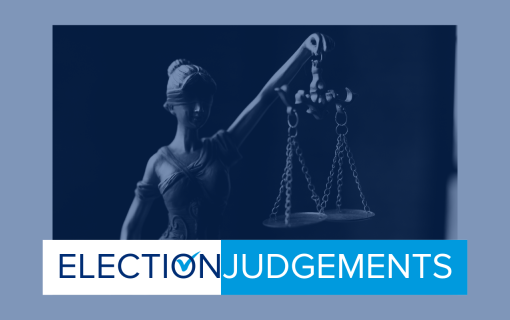IFES Q&A with Former Chief of Party in Nigeria Carl Dundas
Interviewee: Carl Dundas
Carl Dundas is an elections expert with more than 26 years of professional experience. Dundas, former IFES Chief of Party in Nigeria, was also the Director of Elections in Jamaica. His areas of expertise include election organization and management, electoral legislative schemes and constitutional reform relating to electoral matters. He has led technical assistance teams in the design of frameworks for neutral and impartial election management bodies; the establishment of instruments for the transition from a military or one-party system to a multiparty democracy; and capacity-building seminars and workshops. Dundas has demonstrated experience in organizational development and management, including extensive experience in African, Caribbean and Pacific countries through more than 30 overseas assignments and adds a unique perspective to election management.
How did you get into election management?
In 1979, as a member of the Attorney General Department in Jamaica, I was tasked with the responsibility for electoral reform in Jamaica, which included being the technical legal adviser of the Joint Select Committee of Parliament (House of Representatives and the Senate), looking into the issue of electoral and constitutional reform in Jamaica. My primary task was to advise the Joint Select Committee that year on the reform of the electoral law. I moved on from that role in the same year to become the first Director of Elections in Jamaica.
As an election expert with more than 26 years of professional experience, what do you consider to be the greatest challenges for democracy and governance projects?
The challenges for democracy and governance today vary depending on whether or not one is dealing with a new, emerging or mature democracy. The magnitude of the challenges may vary, but with respect to election organization and conduct the most common obstacles are political partisanship, incompetence of electoral staff (often due to inadequate training), corruption and lack of sufficient resources to invest in new electoral technology.
What do you consider to be necessary components or best practices for success in helping countries implement valid elections?
The key to organizing and conducting free, fair and credible elections is a sound legal framework, which may include fundamental electoral provisions in the constitution and a comprehensive electoral law, including regulations or rules for electoral procedures. The relevant election management body—which ought to be structured and operated in accordance with the principles of non-partisanship and efficiency, and provide good electoral services to stakeholders—is also central in the implementation of best practices in election organization.
Did you feel your work at the International Foundation for Electoral Systems (IFES) helped you grow professionally? Which IFES experience (technical or other) do you value most?
My work at IFES enhanced my professional experience. It was my first exposure to the internal administrative working of an NGO as an employee; that is, not merely as an independent consultant.
My IFES experience that I value most was my role in the establishment of the Democracy and Electoral Assistance Unit (DEAU) at the African Union Commission in Addis Ababa, Ethiopia.









